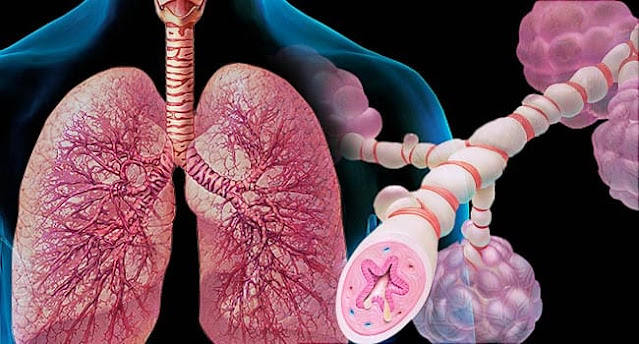WHAT IS ASTHMA?MAIN CAUSES, TYPES OF ASTHMA, SYMPTOMS, HOW DOES ASTHMA AFFECT BODY? ASTHMA CAN BE CURED, DIAGNOSIS, TREATMENT
- ASTHMA DEF.
- CAUSES
- SYMPTOMS
- CUREABLE MAY BE ?
- DIAGNOSIS
- TREATMENT
ASTHMA DEFINITION:
Asthma is a condition in which your airways become narrow and can produce bloating and excess mucus. It makes it difficult to breathe and causes coughing, snoring (wheezing) and shortness of breath when you breathe.
Asthma is a minor problem for some. For others, it may be a major problem that interferes with daily activities and can lead to a fatal asthma attack.
Asthma is not curable, but its symptoms can be controlled. Because asthma often changes over time, it is important that you work with your doctor to track your signs and symptoms.
MAIN CAUSES / TRIGGERS OF ASTHMA:
People with asthma have airways that are sensitive to things that do not bother other people. These things are "triggers".
Asthma triggers vary from person to person. Some respond only to a few, others respond to many.
If you have asthma, it is important to keep track of the causes or triggers you know are triggering your asthma flares. This can take a little detective work, as symptoms do not always appear immediately upon exposure. Delayed asthma episodes can occur depending on the type of trigger and how sensitive the person is to it.
The most common asthma triggers are:
Allergies (Allergic Asthma)
Substances that cause allergies can trigger asthma. If you inhale what you are allergic to, you may experience asthma symptoms. It is best to prevent or limit exposure to known allergens to reduce or prevent asthma episodes.
Common Allergic Factors That Cause Allergic Asthma:
- Dust particles
- Cockroach
- Pollen
- Mold
- Pet dandruff
- Mouse
Learn more about allergic asthma.
1- Irritant In The Air:
Environmental irritants can also trigger an asthma episode. Although people are not allergic to these substances, they do irritate the inflamed, sensitive airways:
- Cigarette smoke
- Air pollution such as fog, ozone and others
- Wood fire
- Coal grill
- Strong perfumes, vapors or odors (such as paint, gasoline, perfume and scented soap)
- Dust and particles in the air
- Chemicals
2- Other Health Conditions:
Some similar conditions can also aggravate the symptoms of asthma. These include:
- Allergic bronchopulmonary aspergillosis (ABPA)
- Obstructive sleep apnea
- Chronic Obstructive Pulmonary Disease (COPD)
- Food allergies
- Food-induced anaphylaxis
- Sulfites in the diet
- Hormonal changes during the menstrual cycle
- Food-induced anaphylaxis
- Gastroesophageal reflux disease (GERD)
- Obesity
- Nasal polyps
- Pregnancy
- Respiratory infections
- Cold
- Flu (Influenza)
- Pneumonia
- Sinusitis or sinus infection
- Sore throat
- Rhinitis
3- Exercise:
Exercise and other activities that help you breathe can have an effect on your asthma. Exercise - especially in cold air - is often the trigger of asthma. Exercise-induced bronchoconstriction (EIB) is a form of physical activity-induced asthma. This is also known as exercise-induced asthma (EIA). Symptoms may not appear even after a few minutes of continuous exercise. (If symptoms appear before this, it usually means you need to adjust your treatment.) With the right treatment, you do not have to limit your physical activity.
Learn more about exercise-induced asthma.
4- Weather:
- Dry air, cold air or sudden changes in the weather can sometimes cause asthma.
5- Thunderstorm Asthma:
If thunderstorms occur during periods of high pollen count and high humidity, thunderstorms can also affect people with asthma. Rain can kill pollen and break the grain into smaller pieces. The air from the storm circulates around these cells, making it easier for people to breathe.
6- Feeling and expressing strong emotions
- Anger
- Fear
- Excitement
- Laughter
- Word
- Crying
- When you experience strong emotions, your breathing changes - even if you do not have asthma. It can cause snoring or other asthma symptoms in a person with asthma.
7- Drugs / Medicines:
Some medications can also trigger asthma, including:
- Aspirin and NSAIDs (Nonsteroidal Anti-Inflammatory Drugs)
- Drugs called beta blockers - they make it harder to control asthma
Talk to your health care provider about your asthma and your triggers. Be sure to discuss any changes in your asthma management.
Symptoms Of Asthma:
The symptoms of asthma vary from person to person. You may have occasional asthma attacks, symptoms only at certain times - such as when exercising - or symptoms at all times.
Asthma signs and symptoms:
- Difficulty in breathing
- Chest tightness or pain
- Snoring when inhaled, is a common symptom of asthma in children
- Sleepiness due to difficulty in breathing, coughing or snoring
- Cough or snoring attacks worsened by a respiratory virus such as the common cold or flu
Signs that your asthma is probably getting worse:
Asthma signs and symptoms are more frequent and embarrassing
- Difficulty in breathing increases, as measured by the device used to check how well your lungs are working (peak flow meter)
- A quick-relief inhaler should be used more often
For some, certain conditions can cause asthma signs and symptoms:
1- Exercise-Induced Asthma:
Which worsens when the air is cold and dry
2- Occupational Asthma:
That causes irritation in the workplace such as chemical fumes, gases or dust
3- Allergic-Induced Asthma:
Can be triggered by airborne substances such as pollen, mold spores, cockroach waste or skin worms and dried saliva (pet dandruff) from pets.
TYPES OF ASTHMA:
When you are diagnosed with asthma, the health professionals treating you will not necessarily recommend that you have a specific type of asthma. They may refer to it as a type of asthma, asthma stage, asthma stage or asthma classification - it usually depends on the frequency and severity of your symptoms. Below are four classifications that your doctor may use:
1- Mild Intermittent:
Most people have this level of asthma, which does not interfere with daily activities. Symptoms are mild, lasting two days a week or less than two nights a month.
2- Mild Persistent:
Symptoms appear more than twice a week - but not daily - and up to four nights a month.
3- Median Persistent:
Symptoms occur daily and at least one night each week, but not overnight. They can limit some daily activities.
2- Severe Persistent:
'Symptoms occur several times each day and mostly at night. Daily activities are very limited. It is not a 'severe asthma' diagnosis, it is very difficult to make a specific classification and treatment of asthma.
When you call asthma Australia, we look at how your asthma affects your life; Is it well controlled? Or not properly controlled? We also take into account your overall health, lifestyle, asthma, allergic crossovers and other medical conditions that affect well-being, as these factors affect your asthma and asthma management.
We will also review your medications and make sure you know how to use them and understand what they are used for. We will look into the deficiencies in your treatment and assist you in resolving them with the help of your doctor.
How Does Asthma Affect The Body Physically?
If you have asthma, the inner walls of the airways in your lungs may become swollen and inflamed. In addition, the layers that cover your airways secrete excess mucus. The result is an asthma attack. During an asthma attack, your narrow airways make it difficult to breathe and you may experience coughing and snoring.
Asthma Can Be Cured?
There is currently no cure for asthma, but treatment can help control the symptoms so that you can live a normal, active life. Inhalers, devices that allow you to breathe in medicine, are the main treatment. Pills and other treatments may also be needed if your asthma is severe.
DIAGNOSIS:
1- Physical Examination
Your doctor will perform a physical examination to rule out other possible conditions, such as a respiratory infection or chronic obstructive pulmonary disease (COPD). Your doctor will also ask you questions about your signs and symptoms and any other health issues.
2- Test To Measure Lung Function
You may be given lung function tests to find out how much air is moving in and out when you breathe. These tests may include:
Spirometry.
This test is used to assess the contraction of your airways after a deep breath to see how much air you can inhale and how fast you can inhale.
Maximum Flow / Peak Flow
A peak flow meter is a simple device that measures how hard you breathe. A lower than normal peak flow reading indicates that your lungs are not functioning properly and that your asthma is getting worse. Your doctor will give you instructions on how to track and deal with low peak flow readings.
Lung function tests are often done before and after taking the drug to open your airways, called a bronchodilator (brank-co-die-le-tur), like albuterol. If your lung function improves with the use of a bronchodilator, you are more likely to have asthma.
Additional Testing:
Other tests to diagnose asthma:
1- Methocoline Challenge.
Methacholine is an asthma trigger. When inhaled, it makes your airway a little narrower. If you respond to methacholine, you may have asthma. This test can be used even if your initial lung function test is normal.
2- Imaging Test
A chest X-ray can help diagnose any structural abnormalities or diseases (such as infections) that may cause or exacerbate breathing problems.
3- Allergy Testing
Allergy testing can be done through a skin test or a blood test. They will tell you if you are allergic to pets, dust, mold or pollen. If an allergy trigger is detected, your doctor may recommend allergy shots.
4- Nitric Oxide Test.
This test measures the amount of gas nitric oxide in your breath. When your airways are inflamed - a sign of asthma - you may have higher than normal nitric oxide levels. This test is not widely available.
5- Sputum Cosinophils.
This test looks for some white blood cells (eosinophils) in a mixture of saliva and mucus (sputum) that you secrete when you cough. Eosinophils are present when symptoms develop and appear as a pink stain.
6- Exercise And The Provocative Test For Cold-Induced Asthma
During these tests, your doctor will measure your airway obstruction before and after strenuous physical activity or before inhaling too much cold air.
The right medication for you depends on many factors - your age, symptoms, asthma triggers and what is best for controlling your asthma.
MEDICATIONS:
Preventive, long-term control medications reduce inflammation (inflammation) in your airways, which can lead to symptoms. Quick-relief inhalers (bronchodilators) quickly open the airways that restrict breathing. In some cases, allergy medications may be necessary.
1- Long-Term Asthma Control Medications
Usually taken daily, are the mainstay of asthma treatment. These medications help control asthma on a daily basis and thereby reduce the chances of an asthma attack. Types of long-term control medications:
These drugs include fluticasone propionate (flowent HFA, flowent discus, xans), budesonide (pulmicort flexheiler, pulmicort resplex, rhinocort), cyclosonide (alvesco), beclomethasone, and beclomethasone ()
You may need to use these medications for several days to weeks to reach maximum benefit. **** Unlike corticosteroids, inhaled corticosteroids carry a risk of serious side effects.
These drugs - including Mantelukast (singular), Zafirlucast (Acolate) and Xylutan (Xyflo) - can help relieve asthma symptoms.
Mantelcast is associated with psychological reactions such as anxiety, aggression, hallucinations, depression and suicidal ideation. Seek medical advice immediately if you experience any of these reactions.
Drugs containing fluticasone-salmetrol (Advair HFA, Airduo Digihaler, etc.), budesonide-formoterol (Symbicart), formoterol-momatazone (Dulera) and fluticasone furote-vilanterocala (Brio) are long-acting. . A corticosteroid.
Theophylline (Theo-24, Elixophyllin, Thiocron) is a daily tablet that helps keep the airways open by relaxing the muscles surrounding the airways. It is not used as often as other asthma medications and requires regular blood tests.
Quick-paced (rescue) medications are used for rapid, short-term relief of symptoms during an asthma attack. They can also be used before exercise if recommended by your doctor. Types of quick-relief medications:
- Short-acting beta agonist.
These inhaled, quick-relief bronchodilators work in minutes to rapidly reduce symptoms during an asthma attack. These include albuterol (ProAir HFA, Ventolin HFA, etc.) and levelbuterol (Xopenex, Xopenex HFA).
- Short-acting beta agonists
can be taken in a portable, hand-held inhaler or using a nebulizer, which sends asthma medications into a nice fog. They breathe through a face mask or mouthpiece.
Like other bronchodilators, ipratropium (Atrovent HFA) and thiotropium (Spiriva, Spiriva respimat) quickly relax your airways and facilitate breathing. These are mostly used for emphysema and chronic bronchitis, but can also be used to treat asthma.
and intravenous corticosteroids. These drugs - prednisone (prednisone intensol, rios) and methylprednisolone (Medrol, Depo-Medrol, Sol-Medrol) - provide relief from airway inflammation caused by severe asthma. They can cause serious side effects when used for a long time, so these drugs are best used only on a short-term basis to treat severe asthma symptoms.
HOMOEOPATHY TREATMENT OF ASTHMA:
1- Aconite
Dry, irritating cough in winter or when exposed to cold air. Colds cause snoring and bronchial pain. It is usually given in the case of severe asthma when a person coughs with snoring on the breath. There is a feeling of tightness or contraction in the chest. Due to this asthma condition, the person becomes very restless and scared. By giving this medicine repeatedly, it can relieve chest tightness as well as cough and shortness of breath.
2- Arsenic album -
Snoring asthma on breath. Chest tightness and difficulty in breathing are associated with asthma. In the lying position, the person experiences tightness in the chest and difficulty in breathing. In a sitting posture, he leaned forward slightly and relaxed slightly. There is a feeling of restlessness and anxiety associated with asthma. The mouth feels dry and wants to drink water but very little at a time.
3- Ars Iod -
Allergic Asthma. Asthma is caused by exposure to allergens such as dust, pollen, and pet dandruff. Nosebleeds with runny nose. Inflammation with watery secretions in the nose and eyes before the onset of asthma. Allergies can cause nasal congestion. Red congestion eyes, burning nasal discharge. Nose mound. It is commonly referred to as asthma of allergic origin.
4- Bacilliunm
This is commonly referred to as the constitutional treatment for asthma. A person is very likely to be cold. During a cold, sneezing can lead to allergies, runny nose, cough and asthma. There is a contraction sensation in the chest that causes suffocation due to bronchial spasm. Cough and snoring are more common at night. A person may have a hereditary asthma condition.
5- Blata orientalis
This is usually given as a mother tincture or with low potency to control an acute attack of asthma. Taking the drug in physical dosage reduces snoring in the breath and tightness in the chest. Medications can be taken repeatedly to relieve symptoms such as chest tightness and shortness of breath during an acute attack.
6- Sambucus
especially in children with bleeding from the nose and the child wakes up without suffocation. Chest tightness and abdominal pressure, and nausea, severe shortness of breath during midnight coughing, crying and difficulty breathing. Baby snuffles; Dryness and obstruction of the nose. When the nursing nose is blocked, breathing is not possible. The child suddenly wakes up at night without breathing and sits up, his face turns blue. It is also indicated in industrial asthmatic disorder.
7- Calcarea Carb
This is the constitutional medicine that is usually given to asthma patients. Lack of physical activity makes a person a little fat. Mild physical activity can cause excessive sweating from the head or other parts of the body. A person can not tolerate heat, wants open air but open space is not enough. The child has a tendency to catch a cold easily. In general, an allergic condition can lead to the onset of asthma later in life.
USE ALWAYS ANY MEDICINE AFTER DOCTOR ADVISE
FPR MORE DETAIL VISIT MY CHANNEL:
DR.TAYYIBA AJ














0 Comments